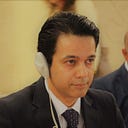AHMED QURAISHI ON IRAN INTERNATIONAL TV: PAKISTAN FREQUENTLY INTERVENED TO HELP SOLVE CLERICAL REGIME’S FOREIGN POLICY PROBLEMS SINCE 1979
I was interviewed by Iran International TV’s Dr. Jawad Hamdani in Islamabad on the day Pakistani Prime Minister Imran Khan headed to Tehran, on Oct. 13, 2019.
Brief points from the conversation:
1. By mediating between Iran and others, Pakistan is signaling to the states in the region that Islamabad considers Gulf security a vital national interest that merits Pakistani intervention. In the minds of Pakistani officials, this intervention is political and diplomatic. Islamabad will not discuss a military intervention since it wants to avoid that situation. But it does have a peacetime military presence in the region with the consent of local partners. This presence is in cooperation with the United States, Gulf and international partners. And there is a rudimentary military relationship with Iran, especially naval exchanges.
2. Pakistan has a long history of helping the clerical oligarchy in Iran resolve its foreign-policy problems, in a way showing the powerful Iranian mullahs that Islamabad minds their interests and wants good relations. Pakistani officials often conveyed messages from the US and Arab states to post-1979 Iran.
3. Currently, Pakistan is mediating two different Iran tracks: with US on President Trump’s request, after a stalemate in French and Japanese efforts, and between Tehran and Riyadh. Both states did not ask for Pakistani help, but Prime Minister Khan wants to give it a shot. Besides retaining a role in an important region, Khan also wants to pander to a religious vote bank that believes Pakistan should help bring Muslim states together.
4. Not known to many is that Pakistan has mediated between US and Iran on several occasions since 1979. In 2006, Islamabad quietly pushed Tehran to freeze uranium enrichment as a goodwill gesture and accept an offer by then US secretary of state Condoleezza Rice for direct talks, nine years before JCPOA.
5. Iran welcomes talks with the Saudis but currently is more interested in improving relations with the West than with KSA and Arab states, so possibly may not push on talks with Saudi Arabia. Iran also wants the Saudis to accept Iranian proxies in several Arab countries [Houthis + Hezbollah] and accept Iran’s authority over Shia citizens in Arab countries. In short, Saudis should accept Iran’s role inside several Arab states.
6. Saudi Arabia welcomes talks with Iran on the following conditions: end ballistic missile program, end interference in Arab countries, end support to proxy militias, let Houthis make peace with the government of Yemen, and “act like a normal country,” according to a recent tweet by Adel Aljubeir, the Saudi state minister for foreign affairs.
7. One key issue facing Prime Minister Imran Khan and one that also hampers all mediators with Iran is this: Will the IRGC, the armed religious outfit of the clerical government, and which acts as a protector of the clerical regime and its politico-religious agenda, agree to roll back its influence/militias across the Arab region? Mediation success rests on this. But it is possible that Riyadh might settle for Iranian withdrawal from Yemen as a gesture of goodwill. This is likely what Pakistanis are pushing for.
8. Pakistan has some leverage in the Gulf, enough to be taken seriously but not enough to force a solution. Pakistani navy works with the US 5th Fleet in Bahrain, has military ties to all GCC states, and, like the US, has troop deployments in KSA. And it maintains working ties with Iran, which, under international sanctions, is expected to defer to Pakistani ideas, though it would be better not to make much out of it.
9. The chances of the Pakistani mediation between the US and Iran are better than the other track. But even a temporary reduction in tensions across the Gulf, the Arabian Sea, Gulf of Oman, and the Red Sea will be an achievement.
10. Pakistan diplomacy managed a close relationship with Iran despite three decades of mutual tensions on Afghanistan, India and Gulf policies. Pakistan sees Iranian people as close and avoids treating the country in terms of its pre- and post-1979 policies.
Adapted from a Twitter thread posted here.
